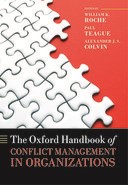 The Oxford Handbook of Conflict Management in Organizations
The Oxford Handbook of Conflict Management in Organizations
Contents
-
-
-
-
-
-
-
-
-
-
Introduction Introduction
-
The Changed Environment The Changed Environment
-
Changes in the Institutions of Third-Party Intervention Changes in the Institutions of Third-Party Intervention
-
-
The Bargaining Process The Bargaining Process
-
Methods of Third-Party Intervention Methods of Third-Party Intervention
-
Conclusion Conclusion
-
References References
-
-
-
-
-
-
-
-
-
-
-
-
-
-
6 Third-Party Processes in Employment Disputes
Get accessWilliam Brown is Emeritus Master of Darwin College and Emeritus Professor of Industrial Relations at Cambridge University. He was previously Director of the Industrial Relations Research Unit at the University of Warwick. He is on the Panel of Arbitrators of the Advisory, Conciliation and Arbitration Service and was a member of its Council. He chairs the dispute procedure of the Fire and Rescue Services. He was a foundation member of the Low Pay Commission, which fixes the National Minimum Wage.
-
Published:03 March 2014
Cite
Abstract
Growing integration of the world economy has challenged the forms of collective conflict resolution that were established in the 20th century. But third-party processes continue to have a role in resolving employment disputes. They have become less judicial and more concerned with facilitating voluntary settlements. They have become more focused on advisory work, on improving employment practices, and on facilitating cooperative approaches to labor relations. This chapter analyses the bargaining relationships involved in employment negotiations. This provides the basis for a discussion of the rationale for the various forms of conciliation, mediation, and arbitration procedures currently used by third parties in resolving disputes.
Sign in
Personal account
- Sign in with email/username & password
- Get email alerts
- Save searches
- Purchase content
- Activate your purchase/trial code
- Add your ORCID iD
Purchase
Our books are available by subscription or purchase to libraries and institutions.
Purchasing information| Month: | Total Views: |
|---|---|
| October 2022 | 11 |
| November 2022 | 4 |
| December 2022 | 5 |
| March 2023 | 4 |
| April 2023 | 2 |
| May 2023 | 4 |
| June 2023 | 3 |
| July 2023 | 5 |
| August 2023 | 5 |
| September 2023 | 6 |
| October 2023 | 22 |
| December 2023 | 6 |
| February 2024 | 2 |
| March 2024 | 2 |
| April 2024 | 3 |
| May 2024 | 2 |
| June 2024 | 1 |
| July 2024 | 1 |
| October 2024 | 5 |
| December 2024 | 1 |
| February 2025 | 3 |
| March 2025 | 2 |
| May 2025 | 2 |

Get help with access
Institutional access
Access to content on Oxford Academic is often provided through institutional subscriptions and purchases. If you are a member of an institution with an active account, you may be able to access content in one of the following ways:
IP based access
Typically, access is provided across an institutional network to a range of IP addresses. This authentication occurs automatically, and it is not possible to sign out of an IP authenticated account.
Sign in through your institution
Choose this option to get remote access when outside your institution. Shibboleth/Open Athens technology is used to provide single sign-on between your institution’s website and Oxford Academic.
If your institution is not listed or you cannot sign in to your institution’s website, please contact your librarian or administrator.
Sign in with a library card
Enter your library card number to sign in. If you cannot sign in, please contact your librarian.
Society Members
Society member access to a journal is achieved in one of the following ways:
Sign in through society site
Many societies offer single sign-on between the society website and Oxford Academic. If you see ‘Sign in through society site’ in the sign in pane within a journal:
If you do not have a society account or have forgotten your username or password, please contact your society.
Sign in using a personal account
Some societies use Oxford Academic personal accounts to provide access to their members. See below.
Personal account
A personal account can be used to get email alerts, save searches, purchase content, and activate subscriptions.
Some societies use Oxford Academic personal accounts to provide access to their members.
Viewing your signed in accounts
Click the account icon in the top right to:
Signed in but can't access content
Oxford Academic is home to a wide variety of products. The institutional subscription may not cover the content that you are trying to access. If you believe you should have access to that content, please contact your librarian.
Institutional account management
For librarians and administrators, your personal account also provides access to institutional account management. Here you will find options to view and activate subscriptions, manage institutional settings and access options, access usage statistics, and more.